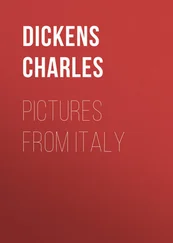Charles Dickens - Pictures from Italy
Здесь есть возможность читать онлайн «Charles Dickens - Pictures from Italy» весь текст электронной книги совершенно бесплатно (целиком полную версию без сокращений). В некоторых случаях можно слушать аудио, скачать через торрент в формате fb2 и присутствует краткое содержание. Жанр: Классическая проза, на английском языке. Описание произведения, (предисловие) а так же отзывы посетителей доступны на портале библиотеки ЛибКат.
- Название:Pictures from Italy
- Автор:
- Жанр:
- Год:неизвестен
- ISBN:нет данных
- Рейтинг книги:5 / 5. Голосов: 1
-
Избранное:Добавить в избранное
- Отзывы:
-
Ваша оценка:
- 100
- 1
- 2
- 3
- 4
- 5
Pictures from Italy: краткое содержание, описание и аннотация
Предлагаем к чтению аннотацию, описание, краткое содержание или предисловие (зависит от того, что написал сам автор книги «Pictures from Italy»). Если вы не нашли необходимую информацию о книге — напишите в комментариях, мы постараемся отыскать её.
Pictures from Italy — читать онлайн бесплатно полную книгу (весь текст) целиком
Ниже представлен текст книги, разбитый по страницам. Система сохранения места последней прочитанной страницы, позволяет с удобством читать онлайн бесплатно книгу «Pictures from Italy», без необходимости каждый раз заново искать на чём Вы остановились. Поставьте закладку, и сможете в любой момент перейти на страницу, на которой закончили чтение.
Интервал:
Закладка:
Hard by here is a large Palazzo, formerly belonging to some member of the Brignole family, but just now hired by a school of Jesuits for their summer quarters. I walked into its dismantled precincts the other evening about sunset, and couldn't help pacing up and down for a little time, drowsily taking in the aspect of the place: which is repeated hereabouts in all directions.
I loitered to and fro, under a colonnade, forming two sides of a weedy, grass-grown court-yard, whereof the house formed a third side, and a low terrace-walk, overlooking the garden and the neighbouring hills, the fourth. I don't believe there was an uncracked stone in the whole pavement. In the centre was a melancholy statue, so piebald in its decay, that it looked exactly as if it had been covered with sticking-plaster, and afterwards powdered. The stables, coach-houses, offices, were all empty, all ruinous, all utterly deserted.
Doors had lost their hinges, and were holding on by their latches; windows were broken, painted plaster had peeled off, and was lying about in clods; fowls and cats had so taken possession of the outbuildings, that I couldn't help thinking of the fairy tales, and eyeing them with suspicion, as transformed retainers, waiting to be changed back again. One old Tom in particular: a scraggy brute, with a hungry green eye (a poor relation, in reality, I am inclined to think): came prowling round and round me, as if he half believed, for the moment, that I might be the hero come to marry the lady, and set all to-rights; but discovering his mistake, he suddenly gave a grim snarl, and walked away with such a tremendous tail, that he couldn't get into the little hole where he lived, but was obliged to wait outside, until his indignation and his tail had gone down together.
In a sort of summer-house, or whatever it may be, in this colonnade, some Englishmen had been living, like grubs in a nut; but the Jesuits had given them notice to go, and they had gone, and THAT was shut up too. The house: a wandering, echoing, thundering barrack of a place, with the lower windows barred up, as usual, was wide open at the door: and I have no doubt I might have gone in, and gone to bed, and gone dead, and nobody a bit the wiser. Only one suite of rooms on an upper floor was tenanted; and from one of these, the voice of a young-lady vocalist, practising bravura lustily, came flaunting out upon the silent evening.
I went down into the garden, intended to be prim and quaint, with avenues, and terraces, and orange-trees, and statues, and water in stone basins; and everything was green, gaunt, weedy, straggling, under grown or over grown, mildewy, damp, redolent of all sorts of slabby, clammy, creeping, and uncomfortable life. There was nothing bright in the whole scene but a firefly—one solitary firefly—showing against the dark bushes like the last little speck of the departed Glory of the house; and even it went flitting up and down at sudden angles, and leaving a place with a jerk, and describing an irregular circle, and returning to the same place with a twitch that startled one: as if it were looking for the rest of the Glory, and wondering (Heaven knows it might!) what had become of it.
In the course of two months, the flitting shapes and shadows of my dismal entering reverie gradually resolved themselves into familiar forms and substances; and I already began to think that when the time should come, a year hence, for closing the long holiday and turning back to England, I might part from Genoa with anything but a glad heart.
It is a place that “grows upon you” every day. There seems to be always something to find out in it. There are the most extraordinary alleys and by-ways to walk about in. You can lose your way (what a comfort that is, when you are idle!) twenty times a day, if you like; and turn up again, under the most unexpected and surprising difficulties. It abounds in the strangest contrasts; things that are picturesque, ugly, mean, magnificent, delightful, and offensive, break upon the view at every turn.
They who would know how beautiful the country immediately surrounding Genoa is, should climb (in clear weather) to the top of Monte Faccio, or, at least, ride round the city walls: a feat more easily performed. No prospect can be more diversified and lovely than the changing views of the harbour, and the valleys of the two rivers, the Polcevera and the Bizagno, from the heights along which the strongly fortified walls are carried, like the great wall of China in little. In not the least picturesque part of this ride, there is a fair specimen of a real Genoese tavern, where the visitor may derive good entertainment from real Genoese dishes, such as Tagliarini; Ravioli; German sausages, strong of garlic, sliced and eaten with fresh green figs; cocks” combs and sheepkidneys, chopped up with mutton chops and liver; small pieces of some unknown part of a calf, twisted into small shreds, fried, and served up in a great dish like white-bait; and other curiosities of that kind. They often get wine at these suburban Trattorie, from France and Spain and Portugal, which is brought over by small captains in little trading-vessels. They buy it at so much a bottle, without asking what it is, or caring to remember if anybody tells them, and usually divide it into two heaps; of which they label one Champagne, and the other Madeira. The various opposite flavours, qualities, countries, ages, and vintages that are comprised under these two general heads is quite extraordinary. The most limited range is probably from cool Gruel up to old Marsala, and down again to apple Tea.
The great majority of the streets are as narrow as any thoroughfare can well be, where people (even Italian people) are supposed to live and walk about; being mere lanes, with here and there a kind of well, or breathing-place. The houses are immensely high, painted in all sorts of colours, and are in every stage and state of damage, dirt, and lack of repair. They are commonly let off in floors, or flats, like the houses in the old town of Edinburgh, or many houses in Paris. There are few street doors; the entrance halls are, for the most part, looked upon as public property; and any moderately enterprising scavenger might make a fine fortune by now and then clearing them out. As it is impossible for coaches to penetrate into these streets, there are sedan chairs, gilded and otherwise, for hire in divers places. A great many private chairs are also kept among the nobility and gentry; and at night these are trotted to and fro in all directions, preceded by bearers of great lanthorns, made of linen stretched upon a frame. The sedans and lanthorns are the legitimate successors of the long strings of patient and much-abused mules, that go jingling their little bells through these confined streets all day long. They follow them, as regularly as the stars the sun.
When shall I forget the Streets of Palaces: the Strada Nuova and the Strada Balbi! or how the former looked one summer day, when I first saw it underneath the brightest and most intensely blue of summer skies: which its narrow perspective of immense mansions, reduced to a tapering and most precious strip of brightness, looking down upon the heavy shade below! A brightness not too common, even in July and August, to be well esteemed: for, if the Truth must out, there were not eight blue skies in as many midsummer weeks, saving, sometimes, early in the morning; when, looking out to sea, the water and the firmament were one world of deep and brilliant blue. At other times, there were clouds and haze enough to make an Englishman grumble in his own climate.
The endless details of these rich Palaces: the walls of some of them, within, alive with masterpieces by Vandyke! The great, heavy, stone balconies, one above another, and tier over tier: with here and there, one larger than the rest, towering high up—a huge marble platform; the doorless vestibules, massively barred lower windows, immense public staircases, thick marble pillars, strong dungeon-like arches, and dreary, dreaming, echoing vaulted chambers: among which the eye wanders again, and again, and again, as every palace is succeeded by another—the terrace gardens between house and house, with green arches of the vine, and groves of orange-trees, and blushing oleander in full bloom, twenty, thirty, forty feet above the street—the painted halls, mouldering, and blotting, and rotting in the damp corners, and still shining out in beautiful colours and voluptuous designs, where the walls are dry—the faded figures on the outsides of the houses, holding wreaths, and crowns, and flying upward, and downward, and standing in niches, and here and there looking fainter and more feeble than elsewhere, by contrast with some fresh little Cupids, who on a more recently decorated portion of the front, are stretching out what seems to be the semblance of a blanket, but is, indeed, a sun-dial—the steep, steep, up-hill streets of small palaces (but very large palaces for all that), with marble terraces looking down into close by-ways—the magnificent and innumerable Churches; and the rapid passage from a street of stately edifices, into a maze of the vilest squalor, steaming with unwholesome stenches, and swarming with half-naked children and whole worlds of dirty people—make up, altogether, such a scene of wonder: so lively, and yet so dead: so noisy, and yet so quiet: so obtrusive, and yet so shy and lowering: so wide awake, and yet so fast asleep: that it is a sort of intoxication to a stranger to walk on, and on, and on, and look about him. A bewildering phantasmagoria, with all the inconsistency of a dream, and all the pain and all the pleasure of an extravagant reality!
Читать дальшеИнтервал:
Закладка:
Похожие книги на «Pictures from Italy»
Представляем Вашему вниманию похожие книги на «Pictures from Italy» списком для выбора. Мы отобрали схожую по названию и смыслу литературу в надежде предоставить читателям больше вариантов отыскать новые, интересные, ещё непрочитанные произведения.
Обсуждение, отзывы о книге «Pictures from Italy» и просто собственные мнения читателей. Оставьте ваши комментарии, напишите, что Вы думаете о произведении, его смысле или главных героях. Укажите что конкретно понравилось, а что нет, и почему Вы так считаете.












